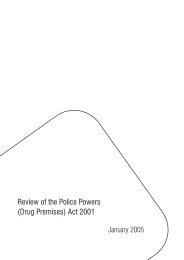Crimes (Forensic Procedures) Act 2000 - NSW Ombudsman - NSW ...
Crimes (Forensic Procedures) Act 2000 - NSW Ombudsman - NSW ...
Crimes (Forensic Procedures) Act 2000 - NSW Ombudsman - NSW ...
Create successful ePaper yourself
Turn your PDF publications into a flip-book with our unique Google optimized e-Paper software.
The availability of persons is sometimes a problem. This can be due to a variety of reasons, such as; the day<br />
and hour, willingness to participate, unsuitable persons selected by the subject, travel arrangements, etc. This<br />
LAC now uses a volunteer group, Criminal Justice Support, which offers a 24/7 service. 723<br />
The location of “acceptable” support people is an issue in the LAC. When dealing with the Aboriginal community<br />
it has been identified that there is a resistance to assist (or be seen to assist) Police by some groups (specific<br />
families and associates). I believe this is not a local issue, however endemic to throughout the state. 724<br />
Problems locating interview friends willing to attend or persons who are not intoxicated. 725<br />
Despite these difficulties, no commands were aware of any instances where interview friends had been excluded.<br />
A total of 60 commands reported having no problems complying with the interview friends provisions, and the<br />
remaining four commands were unable to comment on this issue. 726<br />
To ensure that interview friends are available to all entitled suspects and volunteers, we suggest that every command<br />
maintain a list of appropriate people to use as interview friends. This networking process might also assist local<br />
service providers in understanding their role as an interview friend or independent person.<br />
We note that some commands do not arrange for interview friends, on the basis that this would appear partial. In<br />
our view, a person should be able to choose his or her own interview friend, but if the person has difficulty finding an<br />
appropriate interview friend, police should, so far as is reasonably practical, attempt to find the person an interview<br />
friend.<br />
8.2.1.2. Lists of interview friends for Aboriginal and Torres Strait Islander suspects<br />
Section 116 of the <strong>Act</strong> requires the Attorney General to establish and keep up to date lists of people in different<br />
parts of New South Wales who are suitable and willing to act as interview friends for Aboriginal and Torres Strait<br />
Islander suspects who are under arrest. The Attorney General must consult relevant Aboriginal legal aid organisations<br />
about this. 727<br />
We discussed the problems the Attorney General’s Department has had in complying with this requirement in our<br />
report on the DNA sampling of serious indictable offenders. We noted that the Attorney General’s Department wrote<br />
to all Aboriginal Legal Services in February 2002, seeking nominations for people to be included on the required list.<br />
However, no nominations were received. In June 2002, the Coalition of Aboriginal Legal Services advised the Attorney<br />
General’s Department that nominations would only be provided if the <strong>Act</strong> were amended to prevent interview friends<br />
being called as witnesses for the prosecution. We noted that neither of the previous reviews of the <strong>Act</strong> had made such<br />
a recommendation. 728<br />
We also noted that as forensic procedures are generally video recorded, the need to call interview friends as<br />
witnesses for the prosecution from incidents occurring during a forensic procedure would be quite limited. However,<br />
the fact remained that section 116 was essentially inoperable. For this reason we recommended that the Attorney<br />
General consider whether the <strong>Act</strong> should be amended to prevent an interview friend being called as a witness to the<br />
prosecution for matters directly relating to forensic procedures. 729<br />
As part of our consultation progress for this phase of our review, we wrote to the organisations which are prescribed<br />
as Aboriginal legal aid organisations for the purpose of the <strong>Act</strong>, but did not receive any comments about this issue. 730<br />
Through our monitoring activities, we found that commands which maintained lists of suitable people were best<br />
able to comply with the provisions of the <strong>Act</strong> relating to interview friends. We are not aware of any instances where<br />
interview friends have been called as witnesses for the prosecution and are not aware of any instances where people<br />
asked to act as interview friends were concerned about this either.<br />
Given this, in our view local area commands should maintain lists of names and contact details of people who are<br />
suitable and willing to act as interview friends for the purposes of the <strong>Act</strong>.<br />
8.2.2. Independent witnesses<br />
Where police wish to conduct a forensic procedure on a volunteer, the volunteer’s consent must be obtained in the<br />
presence of an independent person. 731 The volunteer’s consent is not effective unless it is in writing, signed, and<br />
witnessed by an independent person. An independent person is a person other than a police officer or other person<br />
involved in the investigation. 732<br />
We found that these requirements are not always being met.<br />
136<br />
<strong>NSW</strong> <strong>Ombudsman</strong><br />
DNA sampling and other forensic procedures conducted on suspects and volunteers under the <strong>Crimes</strong> (<strong>Forensic</strong> <strong>Procedures</strong>) <strong>Act</strong> <strong>2000</strong>

















